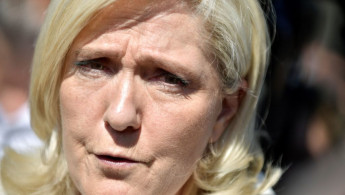French elections: Far-right presidential candidate Marine Le Pen backs down on hijab ban
Banning the Islamic headscarf in the street is "no longer a priority" for the French far-right leader and presidential candidate Marine Le Pen, her campaign team told French media on Sunday.
Banning the hijab "comes after fighting Islamism, closing Salafi mosques, and cutting their funds," Le Pen's campaign spokesperson Sebastien Chenu told French TV channel BFM TV on Sunday.
"Once we will have closed Salafi mosques, cut their funding, outlawed Salafism, believe me, we will have taken off 90% of Islamic headscarves," he added.
Le Pen still plans to ban the hijab in "all public buildings and administrations," Jordan Bardella, the vice-president of Le Pen's National Front party told radio station Europe 1 the same day.
However, the ban would not extend to the streets as the presidential candidate initially announced, Bardella said - though he said banning the wearing of the hijab in public spaces would remain a "long-term goal".
The second round of the French presidential election on 24 April will pit incumbent president Emmanuel Macron against Le Pen.
The far-right candidate has promised to drastically reduce immigration from outside Europe and denounced what she perceives as the growing influence of "radical" Islam in French society.
Le Pen announced days before the first round of the French presidential election, held on 10 April, that she planned to outlaw the hijab in public if elected. Her recent turnaround could signal an attempt to woo more moderate right-wing voters to support her.
Macron said last week that he opposed Le Pen's proposal to ban the wearing of the hijab in public places.
The latest polls prefigure a tense and tight duel between the two presidential candidates.
For now, Macron is expected to win by a much smaller margin than in 2017, when he trounced Le Pen by winning two-thirds of votes.
France banned Muslim women and girls from wearing the headscarf at schools in 2004.
It banned the wearing of the niqab or burqa in public in 2011.





 Follow the Middle East's top stories in English at The New Arab on Google News
Follow the Middle East's top stories in English at The New Arab on Google News
![The UAE is widely suspected of arming the RSF militia [Getty]](/sites/default/files/styles/image_330x185/public/2024-11/GettyImages-472529908.jpg?h=69f2b9d0&itok=Yauw3YTG)
![Netanyahu furiously denounced the ICC [Getty]](/sites/default/files/styles/image_330x185/public/2024-11/GettyImages-2169352575.jpg?h=199d8c1f&itok=-vRiruf5)
![Both Hamas and the Palestinian Authority welcomed the ICC arrest warrants [Getty]](/sites/default/files/styles/image_330x185/public/2024-11/GettyImages-2178351173.jpg?h=199d8c1f&itok=TV858iVg)